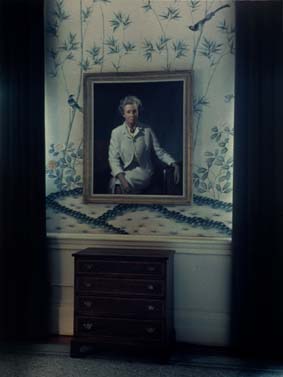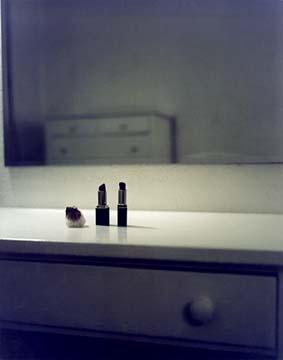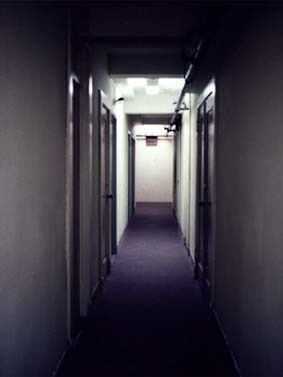1st guard: Entering the building up the stairs and through the double-sided brass doors, you find yourself in a reception area. The lady behind the desk welcomes strangers by asking if they need help. It takes a couple of weeks until she will understand that you are not visiting.
2nd woman: Every time I enter the building, I notice the old guy sitting on the bench next to the tree. He sits there every day. He seems to be waiting. He watches the women pass by. Walking up the stairs I feel uncomfortable wondering if he knows all our faces.
2nd guard: Approximately 300 women are living in the building. 327 mailbox-doors, each marked with a number and a keyhole to insure private access. The first floor invites you with the reception, the spacious lounge with the grand piano, the library, several visitor-rooms, semi-private, the bridge room, the blue room and the music room.
a woman: I moved here in '94. I heard about it from a friend. It was a Friday in March when I arrived. I took my suitcases upstairs to the room. The corridors were narrow, the doors to the rooms lined up along the sides. Searching for my room-number, I could feel the density of the space.
rendell: The experience, perception, use appropriation and occupation of architecture need to be considered in two ways: first as a temporal activity which takes place after the 'completion' of the building, which fundamentally alters the meaning of the architecture, displacing it away from architects and builders towards the active user; second as the re-conceptualization of architectural production, such that different activities reproduce different architecture over time and space, recognizing that architecture is constituted through its occupation. 2000.
1st guard: No men are allowed above the second floor. Private usage.
visitor: On those floors, the building is mapped out in a U-shape, if you walk in the corridor from one end to the other you have to turn a corner 6 times and turn around another 5 times because of dead ends. There are several identical looking staircases. The building feels urban.
again: Next to the phones in the corridors you can find an ashtray. The phone is fixed to the wall at eye-level. To cross people using the phones on the corridors does not leave a lot of space.
guard: The building is in its 80th year. Founded by a man of wealth in 1920 with the honorable intention to give women the protected and clean environment they needed to become a respectable participant of society.
2nd guard: In the 20's they were only accepting Caucasian women born in the United States as tenants. I don't know when that changed. Now the house is open to all women.
wittig: The class-struggles between women and men, which are undertaken by all women, is that which resolves the contradictions between the sexes, abolishing them at the same time that it makes them understood. One should notice that the contradictions always belong to a material order. Before the conflict, there are no categories of opposition but only difference. 1998.
receptionist: Please advise your friends from outside to ask for you with the full name when calling. For your own safety we recommend never telling your room number. Calls will always be received at the switch-board and connected to your room.
2nd guard: Room 207. The floor is concrete painted brown, the gray rug on top. The furniture is made out of metal, painted white in many layers. Every piece has wheels where it touches the ground, to be moved easily when needed.
first woman: When I walk along the corridor on the fifth floor, I can hear the noises coming from some rooms. Inside my room, I can hear my neighbor talk on the phone. I am not alone.
woman: Private. Space not sound.
guard: The cube of the room is a multiplier of acoustic traces. The sound is carried through the building.
third woman: Leaving the room to the outside, the way always passes the mirror. Moving from inside to outside one's image is reproduced, first large then the second mirror on the left side next to the door, above the sink, shows the head only.
narrator: The bar was around the corner, two blocks up. It was kind of late that night. First she noticed them for their loud laughter. There were about eight of them sitting at the corner-table, talking, discussing, giggling and taking each other's pictures. The next time she looked, two were kissing passionately. Then they stopped, turning their heads, with serious faces, leaving her with a tickle in her stomach.
butler: The return to biology as a ground of a specific feminine sexuality seems to defeat the feminist premise that biology is not destiny. 1990.
2nd guard: Breakfast is served in the dinning-room, on the garden level, between 6:45am and 8:45am. 9 o'clock is too late. Lunch from 11:45am to 12:30am and dinner from 5:30pm to 7:45pm. No dinner is served on Sunday.
woman: Often there is enough room to sit alone at one of the square tables for four women. To join someone means conversation. Radio on.
2nd woman: I went to the movies last night. An actress, short-haired and skinny. She wears a blue and white striped T-shirt. The institution which provides the setting for the story seemed familiar. My friend told me that some of his female friends were put there in their twenties. They were daughters of wealthy families. It was meant to be a place for women to rest.
lorde: For women, the need and desire to nurture each other is not pathological but redemptive, and it is within that knowledge that our real power is rediscovered. It is this real connection which is so feared by a patriarchal world. Only within a patriarchal structure is maternity the only social power open to women. 1979.
radio: ... A survey held in the context of the presidential primaries next week found that 16% of women, registered voters, wouldn't vote for a woman as president because she is a woman. 17% of men would do the same. We have some women on the phone who belong to the 16% who have doubts that a woman would be suitable to lead our country, Melanie from New Jersey, welcome to ...
sign: Please dress appropriately in the dining-room. Slippers, bathrobes or short pants cannot be accepted.
1st guard: You are welcome to invite guests from outside the house to eat with you. Please pay for them at the reception-desk before entering the dinning-room. Radio off.
other woman: The elevator. In the small area in front, I stand waiting. Inside the cabin, a collection of tenants from other floors, time expands through the movement of the elevator.
riley: Instead of veering between deconstruction and transcendence, we could try another train of speculations: that 'women' is indeed an unstable category, that this unsuitability has a historical foundation, and that feminism is the side of the systematic fighting-out of this instability - which need not to worry us. 1988.
narrator: They met on the 7th floor. Their hair looks somehow similar. Sharing thoughts and ideas, they developed a habit of bowing their heads slightly toward each other. She remembers the first time; sitting in a movie theater, she noticed how her ear got touched by the other's lips.
first woman: I come home from work at 6pm; I walk along the corridors from the elevator to room 705. Magenta Royal, Perfect Mauve, Topaz, Desert Sand, Romantic Rose, Cabernet, Garnet, Bisque, Simply Beige, Wild Berry, Dangerous Red. The smell of nail-polish used behind closed doors.
guard: Women of all ages live here. Most of them are in their early twenties, coming from foreign countries. Few women are between 30 and 50 years in age. They leave the house early in the morning, dressed in business-wardrobe. The group of women sitting together at dinner time, at the large table near the window, has been living here for a very long time. They are now in their seventies. They don't like to be disturbed.
visitor: My friend lived here for 18 years. She appreciated the safe environment. Last year at the age of 65 she got married and moved out. Now she lives in my neighborhood.
grosz: Until contemporary knowledge comes to term with these questions -- transforming the individuals position or status from producer to product -- we remain caught within intellectual systems that justify or rationalize existing norms instead of facilitating the exploration of other historical subordinated possibilities. 1990.
narrator: She had found a sentence in a book. It stayed in her mind. She went back downstairs to the library to write it down. Somebody had taken the book. When she visits her friend on the seventh floor she sees the book on the shelf. She opens it to the memorized page and reads to her: Paradise, the final endemic condition whose ultimate realization remains elusive as a miracle, yet inspires and justifies, the never ending effort to achieve it. Her friend looks up and laughs.
guard: Every morning between 9am and 11am the rooms are taken care of. The beds are made, the waste basket is emptied, towels replaced. Please remember to take all your personal belongings from the bed. Once a week the sheets are replaced. A charge is incurred for heavily soiled or damaged linen.
third woman: She came to see me because she liked me. We went for a drink. She talked about herself. I talked about myself. The restaurant was closing. We went to a bar and kept on talking. When the bar closed we looked for another place nearby. It was too late. The streets were empty. We wanted to be together some more time. The night-guard recognized my face and asked her to show her keys. She showed him mine. It was quiet in the hallways when she came up to my room. We were tired. The bed is the only place to sit, we laid down and kept on talking. Our bodies happened to touch each other. And then we were kissing. Everything became very simple. I let myself go. It felt good. I did not feel it would be like this with a woman, I had no idea.
2nd woman: The other day I picked up a phone in the corridor. The line was in use. They are accusing me of taking the newspaper from the lobby to my room. Suddenly the phone rings in your room and you get accused of something -- her voice got weak. It is unbelievable in here. I am sure they even listen in on the phone-lines. Why am I staying here? A male voice answers calmly, comforting. He seems to be in another country. Quietly, I hung up the receiver and left the building.
narrator: They sit in the garden, talking about their future. She tells her she wants to sing and starts: Ella no lo sabe, pero alguna noche la ira a buscar. Ella quiere el cielo, yo se lo puedo regalar, demasiado no sera. -- hmhmhm -- Princesa solitaria no vas a estar sola nunca mas. Quiero darte un consejo, que no es negarte la verdad. Llegare a despertarte, te beso en tu sonrisa y todo cambiara ...
sign: Please turn off the light when leaving this room. Thank you. The management.
lorde: Within the interdependence of mutual (nondominant) differences lies that security which enables us to descent into the chaos of knowledge and return with a true vision of our future, along with the concomitant power to effect those changes which can bring that future into being. Difference is that raw and powerful connection from which our personal power is forged. 1979.
third woman: Glad to have slipped unseen into the shower across the hallway from my room. The door closes with a key. I undo my bathrobe and see the gap of 5 inches on the bottom and the top of the wall that separates this shower from the next. Turning on the water, I sing as loud as I can.
2nd guard: To the left you can find the showers. There are four showers in each wing of the building, eight on each floor. You can also find two bathtubs at the end of this corridor. The bathrooms are communal. The cotton bags in the trash-bins next to the sinks are from the 1950's.
visitor: I had signed in at the desk. The receptionist advised me to take the elevator. On the fifth floor I was the only one stepping out. The clock above the bulletin board showed 9:30. A sign lead me to the right. The door to number 517 was to my left. Before I knocked, I noticed the sound of water splashing behind me. The door had no sign. I could see the light behind it at the bottom. The water stopped. I heard 2 steps, barefoot, a towel taken form a hook. I turned around and knocked on 517.
guard: The portrait of the founder of the institution is placed in the lounge on the first floor. Please note the handwritten lines at the left bottom corner which read: Underneath the surface of today lies yesterday and what we call the past is the only truth we can believe. Those lines are believed to be written by Mrs. Raymond who was the director of the house from 1951 to 1973.
narrator: They are dressed up as they go to get dinner. It is Saturday night. They had invited two friends which the receptionist announced through a phone call to their rooms. Meeting in the reception area they say hello and go to the dinning room. In the elevator she tells him that until the seventies they would not serve dinner to the tenants if they were wearing pants. He laughs and gives her a kiss. They only eat the Jell-O at dinner and leave to see a movie.
hooks: As a radical standpoint, perspective, position, 'the politics of location' necessarily calls those of us who would participate in the formation of counter-hegemonic cultural practice to identify the spaces where we begin the process of revision. 1989.
2nd guard: The rooftop is accessible for all the tenants. You are welcome to use it with your female friends. Please note, that to sunbathe it is not allowed to take of any clothing.
again: Unfortunately we can look at a history of unsuitable behavior of tenants in the adjacent buildings.
narrator: It is Sunday. The house is quiet. They planned to go out. She is wearing her new suede pants. When she arrives at her friend's door she hears her on the phone: ... the blue glass, all right ... so it is just you and the guys, hm ... great, so I'll see you at eight ... take care. The phone is put back on the receiver. Steps, the door opens and they find each other face to face.
irigaray: (Re-)discovering herself, for a woman, thus could only signify the possibility of sacrificing no one of her pleasures to another, of identifying herself with none of them in particular, of never being simply one. 1980.
speaker: 305. Please dial the operator. 305.
woman: I have been here for several years. What should you do. It is matter of fact that women need to be protected. Look in the newspaper. They are weaker. It is not easy to find a safe place in the city.
first woman: The morning routine. From my room to the bathroom, to the shower, back to my room, the elevator, down, dining room, elevator up, lobby and then leaving, I count 9 signs. Small signs. Next to door-frames. Turn on the lights. Turn them off. Keep the room clean and dry. Be considerate of others. No bathrobes. Please quiet. Leaving the building I think -- These signs. They make me doubt language. They drown reality. But then again they do not detach language from the imaginary -- by then I have reached the entrance of the subway and walk down the stairs.









